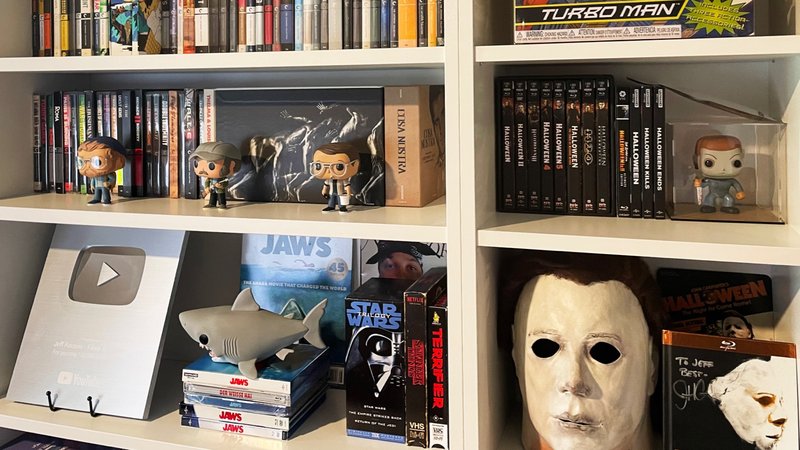Here’s a surprising fact: Most of the movies ever made are not available on streaming platforms.
Maybe that is not too much of a surprise for those who enjoy the well-crafted films of the past. But with the end of DVD rentals by mail, the cinephile and would-be collectors of physical media have only one good source left to build their private libraries: eBay’s marketplace.
Buyers on the marketplace, for example, search for VHS cassettes nearly 5,000 times every day, often for titles that cannot be found on streaming services.
After all, how many times have you looked for that special movie recommendation from your favorite aunt, or that flick you loved as a kid remembered late on a Saturday night, only to discover, the film is unavailable to stream? It is a frustratingly common experience.
Jeff Rauseo, host of the popular YouTube channel Films at Home, understands the predicament the domination of streaming services has forced upon movie lovers.
In many ways, he said, the algorithms that control the watcher’s viewing options leave out serendipity and chance—the thrill of finding an obscure film or classic that not only entertains, but enhances the watcher’s lived experience and broadens their perspective.
“You used to go to a video store, stop in and talk to super knowledgeable people, like a Quentin Tarantino-type behind the counter,” said Jeff. “These were very passionate people. With streaming, there’s no real commitment and no intentional decisions.”
Bill Bant and Jason Masek, hosts of the All ‘80s Movies Podcast, agree streaming-only services have taken away agency for the typical film viewer.
“Streaming service is great, it’s convenient,” Bill said. “But the streaming services are so concerned about making their own original content, they brush aside all the old stuff.”
He prefers building a home library, finding lost classic’s like Roger Corman’s 1960 version of “Little Shop of Horrors” with an early Jack Nicholson cameo. Bill found the DVD in a bargain bin for less than $5. It’s unlikely, he said, that the streamer’s algorithms would ever have offered the obscure Roger Corman version even though it is sometimes available to stream for free, with ads.
The quality of streamed film is the most important distinction between the online services and the physical media in his library. Bill’s DVDs provide a consistent experience. When he puts a DVD in the player, there’s a confidence that the audio won’t be poor quality and the video won’t lag due to a bad connection. Then there is the pride of ownership, he explains. Bill wishes his collection was larger still.
“When you buy a DVD, it’s a richer experience,” Jason said. “A physical copy is tangible. You see it in front of you. People created this, put it on film, and now it’s in this small container you can hold onto and put it in your library.”
eBay’s marketplace offers intentionality for the collector. VHS and DVD sellers consistently recommerce noteworthy and classic films that can’t be universally streamed like “Spice World,” “Mask” and “The Abyss.”
Still, at-home technology of the 1980s and 1990s are not the only options available to cinema enthusiasts seeking quality and curiosities on eBay’s marketplace.
In 2009, Morace Park, a British antiques collector, bought a film reel tin on eBay for $5. The canister contained a lost 1916 Charlie Chaplin six-minute short called “Zepped,” a World War I propaganda film said to feature an early stop motion animation, a dreamscape, and a Zeppelin bombing attack which Chaplin foils.
“I Googled [the film title],” Morace told the Guardian, “and then my interest was pricked. I couldn’t find any sign of it on the internet.”
Fourteen years after the film was discovered on eBay, “Zepped” is still unavailable on any streaming service.
Detail of Jeff Rauseo’s personal collection, including titles from the Criterion Collection, Shout! Factory and Vinegar Syndrome. Credit: Jeff Rauseo.
And then there are the lesser known movies that can only be found on direct-to-consumer sites like the Criterion Collection, Shout! Factory or Vinegar Syndrome. When those distributors are sold out of a particular title, however, Jeff’s go-to market is eBay.
“The nice thing about eBay as a collector is that you can actually see what you’re buying,” said Jeff. “If I went to, say, Vinegar Syndrome for a cult horror film and they were sold out, I’d go to eBay because I want to make sure I’m getting the DVD in good condition, with all the different elements of the box set or limited edition.”
Film critic Richard Brody, writing for the New Yorker, argued in favor of the decentralized home movie collection, too. Brody believes the physical collection is “a progressive act of defiance” against limited streamed options.
“There is an implicit permanence to owning a disk. (Even obsolete media, such as VHS tapes or 78-r.p.m. records, can still be played),” he wrote. “With streaming, availability is out of one’s control and movie-watching becomes an activity conducted under the aegis of a big brother, however well-meaning.”
Innocently enough, as streaming continues to dominate the habits of those watching at home, new generations may miss out on the beloved sci-fi classic “Cocoon” or an uncut version of Bob Fosse’s autobiographical fantasy “All That Jazz,” which is only available to stream with ads.
Jeff’s personal collection boasts more than 2,500 titles of carefully curated films such as “The Uninvited,” a 1944 supernatural horror film from the Golden Age of Hollywood. The ghost story, one of his favorites, can only be found on disc. He wonders, if young filmmakers could not easily get their hands on the physical media of the past, what happens to future productions?
“If you look at every generation of filmmaker, Scorsese for example, they will look to movies from 20, 30 years before their time as inspiration,” Jeff said. “Without access to physical media like the stuff found on eBay, you may lose creative people who aren’t inspired to make significant films anymore.”



